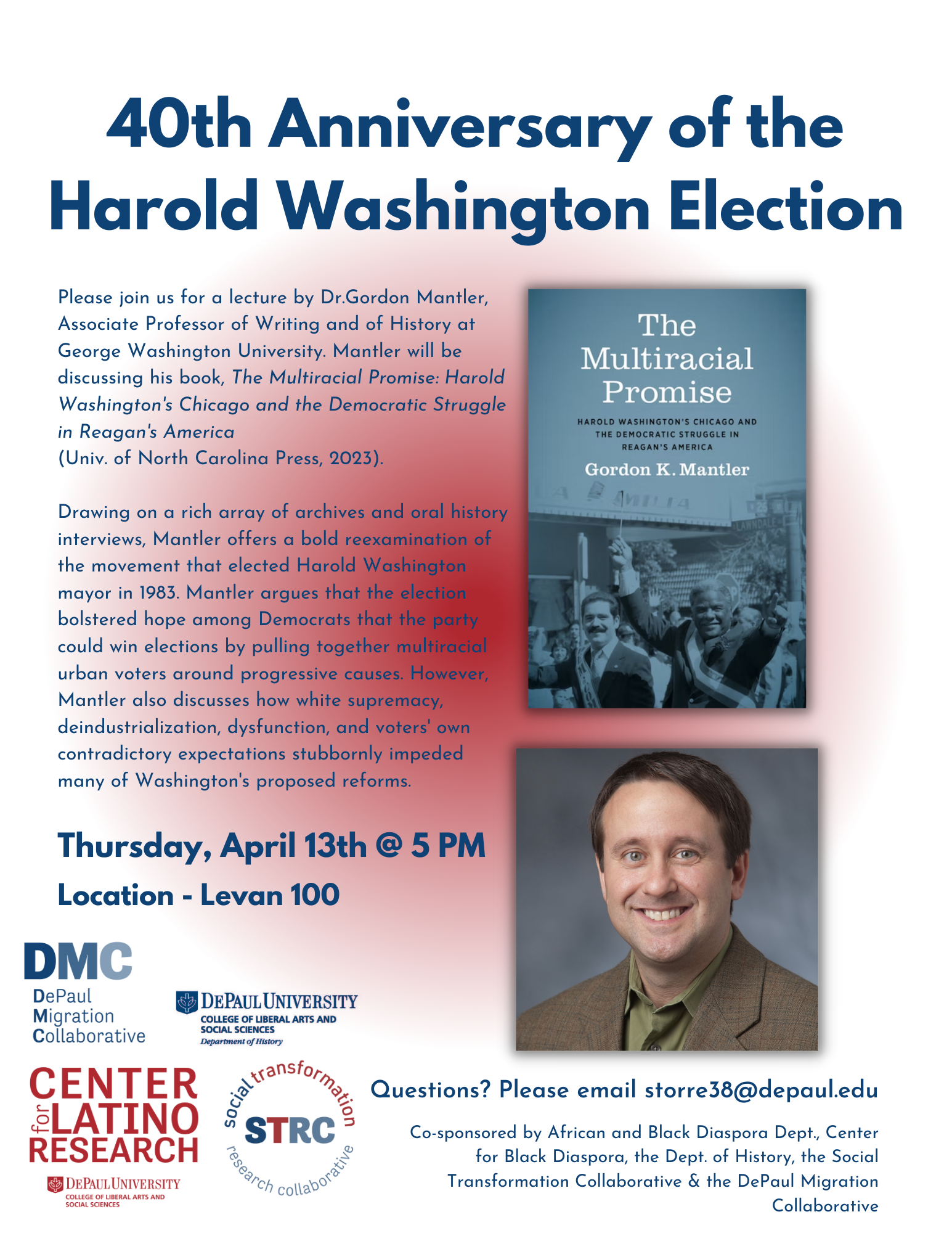DePaul University is honored to announce a multifaceted gift from John and Kathy Schreiber, who are supporting several DePaul programs to help underserved and vulnerable populations. Their generous gift to DePaul includes over $1.2 million pledged to the Schreiber Catholic Future Teacher Leader Program and a nearly $600,000 gift to the DePaul Migration Collaborative, among other transformative programs at DePaul. The Schreibers’ gift also supports the Egan Hope Scholars and the Egan Family Engagement and Coalition Initiative. To see the article, just click here.
04/01/2023 – The 40th Anniversary of the Harold Washington Election

Chicago’s long-standing commitment to being a sanctuary city can be traced back to 1985 when Mayor Harold Washington issued an executive order preventing city employees from participating in immigration enforcement. This order aimed to protect undocumented immigrants and foster trust between law enforcement and immigrant communities. Harold Washington’s legacy as the first African American mayor of Chicago, known for his commitment to social justice and civil rights, continues to inspire the city’s politics and social movements today. To celebrate his contributions, an anniversary event titled “The 40th Anniversary of the Harold Washington Election” will take place on April 13, 2023 (see attached flyer). In addition to this event, “A Clear View from the Prairie: Harold Washington and the People of Illinois Respond to Federal Encroachment of Human Rights” is an upcoming event that will shed light on the struggles faced by immigrants and marginalized communities in the fight for equal rights. Those interested in learning more about Harold Washington and his legacy can read Prof. Craig Mousin’s article titled “A Clear View from the Prairie: Harold Washington and the People of Illinois Respond to Federal Encroachment of Human Rights”.
02/27/2023 – Muslim Minority Against Islamic Nation: The Shias of British India and the Demand for Pakistan, 1940–45
This article analyses the relationship between British colonialism and Islamic sectarianism, and its consequent impact on the Shias, the largest Muslim minority in British India. In the critical decade leading up to independence and partition in 1947, politics in British India were dominated by the Muslim League’s demand for Pakistan. However, leading Shia organizations were opposed to the League’s idea of an Islamic nation and supported India’s independence without partition. Instead, they demanded that the British recognize the Shia as a Muslim minority, and thereby confer statutory protections from Sunni domination. The British government arbitrarily and unjustly ignored Shia entreaties for constitutional protections. Imperial realpolitik required the colonial state to acknowledge the Muslim League as the sole political representative of all Muslims, thus, rendering Pakistan a fait accompli. The intersection of the colonial government’s political calculations with the League’s political ambitions compelled both to discard the Shias. This study of the complex issue of minorities and their uncertain position in the nation promised for all Muslims has relevance for current debates on the nation and nationalism, on minorities and their rights, on sectarianism and majoritarianism, and on the politics of identity. To see the article, just click here.
02/27/2023 – University-Community Collaborations: A Vehicle for Capacity Building and Mutual Learning within an Immigrant Mental Health Coalition
The GEO Community-based Service Learning (CbSL) course article has been published. This collaborative effort includes co-authors from DMC, including our own Ruben Alvarez Silva (Str. Comm.) and Prof. Maria Ferrera (Faculty Advisory Co.) To see the article, just click here.
02/24/2023 – Higher education can do more to help our city’s immigrants By Christopher Tirres and Olya Glantsman
Read the article here
02/03/2023 – The Game of Life: Leveraging Tech for Civics Education
The article by Lien Tran, a member of the faculty advisory council for the DMC, discusses the lack of civics education in the United States, which has contributed to misunderstandings about the First Amendment. Tran suggests that video games could be a solution to this problem, citing the success of iCivics, a collection of games and resources that reimagine civics education and engage students in the topic. Good learning games can situate the meaning of words by relating them to actions, images, and dialogue, and games like Do I Have a Right? specifically address freedom of speech. Tran argues that educators and caregivers should consider the enormous potential of games to transform knowledge, awareness, and perspective on all sorts of societal issues, including civics and government.
By Lien B. Tran
Read the article here
01/26/2023 – 2022 Community Capacity Report
In April 2022, the DePaul Migration Collaborative (DMC) held its first major summit titled “Strategies for a Migrant Planet.” Following the summit, a 40-page report was developed to summarize findings from five focus groups, representing eighteen different greater Chicago area community organizations working in the field of migration.
The focus groups centered around three main themes: 1) the assets of the organization, 2) the barriers that impede them from reaching their fullest aspirations, and 3) possible points of collaboration with DePaul University.
 2022 Community Capacity Report (Final Version).pdf
2022 Community Capacity Report (Final Version).pdf01/13/2023 – Craig Mousin’s Lawful Assembly Podcast: Episode 33: New Year, Same Problems
Imagine you are an asylum-seeker who has left your homeland. Listen to the interview with Secretary Mayorkas and consider its impact as you. Then write to the White House and Secretary Mayorkas and urge the Biden administration to follow the procedures and procedural protections of the Refugee Act of 1980
01/09/2023 – Lunar New Year Offers a Chance to Reflect on Asian American History
It’s critical that we do not homogenize Asian and Asian American Pacific Islander identities. The United States is home to 22 million Asian Americans, who have roots in more than 20 countries.
Educators looking for resources to teach Asian American history should look to organizations like Asian Americans Advancing Justice, as well as museums. Museums are also in the business of education, and there are already leading examples for how emerging technology can be the means and solution for collecting, sharing, educating and even immersing students and museum visitors in difficult histories, while survivors are still alive to share their voices and stories.
By Lien B. Tran, Public Voices fellow through the Op Ed Project
Read the article here
01/09/2023 – Shailja Sharma’s Op-ed titled, “The border ‘crisis’ is a problem that we can solve” has been published in The Chicago Tribune.
Read the article here (subscription required).
